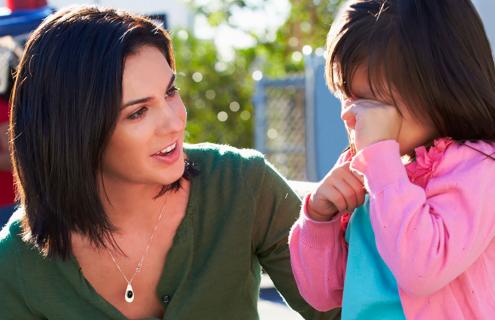
Every seven seconds, a child in the U.S. is bullied, says the American Academy of Pediatrics (AAP). Would you know what to do if your child was caught up in a bullying incident?
Know what to look for and what to do when you witness an incident
Bullying is unwanted, aggressive behavior among school aged children that involves a real or perceived power imbalance. The behavior is repeated, or has the potential to be repeated, over time. Both kids who are bullied and who bully others may have serious, lasting problems.
In order to be considered bullying, the behavior must be aggressive and include:
- An imbalance of power: Kids who bully use their power—such as physical strength, access to embarrassing information, or popularity—to control or harm others. Power imbalances can change over time and in different situations, even if they involve the same people.
- Repetition: Bullying behaviors happen more than once or have the potential to happen more than once.
Taking appropriate action is key to diffusing the situation and protecting those affected
Here’s what you can do if your child is caught up in bullying or if you witnessed an incident:
- Intervene immediately to stop the behavior. Many people think bullying is a normal part of childhood, and kids should resolve their differences without help from an adult, but often that’s not the case.
- Separate the children. Give everyone some breathing room. It’s not necessary to find out what happened immediately.
- Make sure everyone is safe. Has anyone been physically harmed?
- Get help. Attend to any medical or mental health needs. Contact police if a weapon is involved or any one is accused of illegal activity.
- Stay calm. Be reassuring to help kids and bystanders regain their composure.
- Model respectful behavior when you intervene. Explain that bullying behavior isn’t acceptable.
Warning signs for bullying
There are three types of bullying:
- Verbal: saying or writing mean things
- Social: hurting someone’s reputation or relationships
- Physical: hurting a person’s body or possessions
There are many warning signs that may indicate that someone is affected by bullying—either being bullied or bullying others. Recognizing the warning signs is an important first step in taking action against bullying. Not all children who are bullied or are bullying others ask for help.
It is important to talk with children who show signs of being bullied or bullying others. These warning signs can also point to other issues or problems, such as depression or substance abuse. Talking to the child can help identify the root of the problem.
Signs a child is being bullied
Look for changes in the child. However, be aware that not all children who are bullied exhibit warning signs. Some signs that may point to a bullying problem are:
- Unexplainable injuries
- Lost or destroyed clothing, books, electronics, or jewelry
- Frequent headaches or stomach aches, feeling sick or faking illness
- Changes in eating habits, like suddenly skipping meals or binge eating: kids may come home from school hungry because they did not eat lunch
- Difficulty sleeping or frequent nightmares
- Declining grades, loss of interest in schoolwork, or not wanting to go to school
- Sudden loss of friends or avoidance of social situations
- Feelings of helplessness or decreased self-esteem
- Self-destructive behaviors such as running away from home, harming themselves, or talking about suicide
If you know someone in serious distress or danger, don’t ignore the problem. Get help right away.
Signs a child is bullying others
Kids may be bullying others if they:
- Get into physical or verbal fights
- Have friends who bully others
- Are increasingly aggressive
- Get sent to the principal’s office or to detention frequently
- Have unexplained extra money or new belongings
- Blame others for their problems
- Don’t accept responsibility for their actions
- Are competitive and worry about their reputation or popularity
Why don’t kids ask for help?
Kids don’t tell adults for many reasons:
- Bullying can make a child feel helpless. Kids may want to handle it on their own to feel in control again. They may fear being seen as weak or a tattletale.
- Kids may fear backlash from the kid who bullied them.
- Bullying can be a humiliating experience. Kids may not want adults to know what is being said about them, whether true or false. They may also fear that adults will judge them or punish them for being weak.
- Kids who are bullied may already feel socially isolated. They may feel like no one cares or could understand.
- Kids may fear being rejected by their peers. Friends can help protect kids from bullying, and kids can fear losing this support.
Speaking with your child about bullying is important. Support your child by providing consistent discipline and teaching them that it’s not OK to participate in bullying. If your child reports being bullied at school, speak to his or her teacher, school counselor or principal. Your child’s pediatrician is another good resource.
Source: stopbullying.gov, a website sponsored by the Department of Health and Human Services. stopbullying.gov offers a wealth of information, including kid-friendly videos and games, state policies and laws on bullying, as well as where to get additional help if you need it.